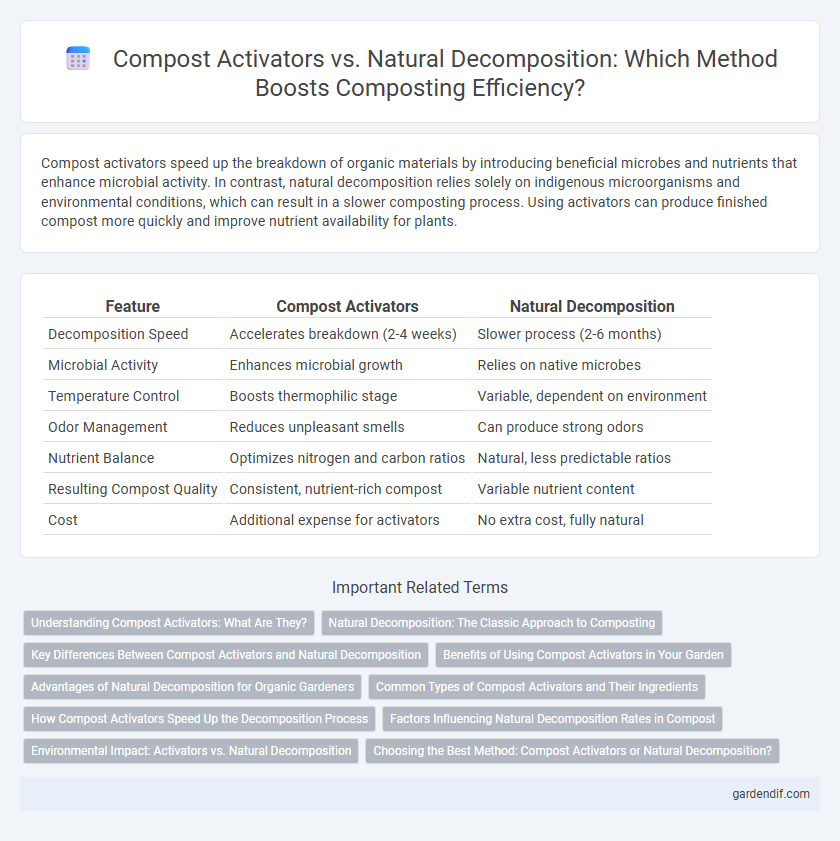
Compost activators vs Natural decomposition Illustration
Compost activators speed up the breakdown of organic materials by introducing beneficial microbes and nutrients that enhance microbial activity. In contrast, natural decomposition relies solely on indigenous microorganisms and environmental conditions, which can result in a slower composting process. Using activators can produce finished compost more quickly and improve nutrient availability for plants.
Table of Comparison
| Feature | Compost Activators | Natural Decomposition |
|---|---|---|
| Decomposition Speed | Accelerates breakdown (2-4 weeks) | Slower process (2-6 months) |
| Microbial Activity | Enhances microbial growth | Relies on native microbes |
| Temperature Control | Boosts thermophilic stage | Variable, dependent on environment |
| Odor Management | Reduces unpleasant smells | Can produce strong odors |
| Nutrient Balance | Optimizes nitrogen and carbon ratios | Natural, less predictable ratios |
| Resulting Compost Quality | Consistent, nutrient-rich compost | Variable nutrient content |
| Cost | Additional expense for activators | No extra cost, fully natural |
Understanding Compost Activators: What Are They?
Compost activators are substances rich in nitrogen, enzymes, or microorganisms designed to accelerate the breakdown of organic materials, enhancing microbial activity and decomposition rates. Unlike natural decomposition, which relies solely on ambient microbes and environmental conditions, compost activators introduce targeted nutrients and beneficial microbes to optimize the composting process. These activators improve temperature regulation, reduce composting time, and produce nutrient-rich humus more efficiently than passive natural methods.
Natural Decomposition: The Classic Approach to Composting
Natural decomposition relies on indigenous microorganisms and environmental conditions to break down organic matter without the need for external activators. This process is slower but preserves the natural microbial balance, enhancing soil structure and fertility over time. Compost created through natural decomposition often contains a diverse array of beneficial microbes, promoting long-term ecosystem health.
Key Differences Between Compost Activators and Natural Decomposition
Compost activators accelerate the breakdown process by introducing concentrated microorganisms, enzymes, and nutrients that optimize microbial activity and reduce composting time from months to weeks. Natural decomposition relies solely on ambient microbial populations and environmental conditions, resulting in a slower, less predictable composting cycle. The key difference lies in the enhanced efficiency and consistency provided by compost activators compared to the variable and extended timeline of natural decomposition.
Benefits of Using Compost Activators in Your Garden
Compost activators accelerate the breakdown of organic materials by introducing beneficial microbes and enzymes, resulting in faster nutrient-rich compost compared to natural decomposition. These activators enhance soil fertility and improve plant growth by providing essential nutrients more rapidly, reducing weed seeds and pathogens. Using compost activators also minimizes odors and helps maintain optimal moisture and temperature levels throughout the composting process.
Advantages of Natural Decomposition for Organic Gardeners
Natural decomposition in composting harnesses indigenous microorganisms and earthworms, promoting a balanced ecosystem that enhances soil health without chemical intervention. This slow, steady process preserves essential nutrients and fosters beneficial microbial diversity, improving plant resilience and growth in organic gardens. Organic gardeners benefit from cost savings and environmental sustainability by relying on natural decomposition rather than synthetic activators.
Common Types of Compost Activators and Their Ingredients
Compost activators accelerate organic matter breakdown by introducing essential microorganisms and nutrients, often containing ingredients like nitrogen-rich materials, enzymes, and beneficial bacteria such as Bacillus subtilis. Common types include nitrogen boosters like blood meal and alfalfa meal, microbial inoculants with effective decomposer microbes, and enzyme-based activators that enhance cellulose and lignin degradation. These activators differ significantly from natural decomposition, which relies solely on ambient microbial populations and environmental conditions, resulting in slower composting processes.
How Compost Activators Speed Up the Decomposition Process
Compost activators contain nitrogen-rich ingredients and microorganisms that accelerate microbial activity, significantly speeding up the breakdown of organic materials. These activators optimize conditions such as moisture, temperature, and pH, creating an ideal environment for faster decomposition compared to natural processes. As a result, compost activators can reduce composting time from months to weeks while enhancing nutrient availability in the final product.
Factors Influencing Natural Decomposition Rates in Compost
Factors influencing natural decomposition rates in compost include temperature, moisture content, oxygen availability, and the carbon-to-nitrogen ratio, which together create an optimal environment for microbial activity. Compost activators, such as nitrogen-rich additives or specialized microbial inoculants, can accelerate the breakdown of organic material by enhancing microbial population density and enzymatic activity. Natural decomposition relies heavily on maintaining balanced conditions, while compost activators provide targeted stimuli to speed up the composting process.
Environmental Impact: Activators vs. Natural Decomposition
Compost activators accelerate organic matter breakdown by supplying essential microbes and nutrients, significantly reducing greenhouse gas emissions compared to slower natural decomposition. Natural decomposition releases methane and other gases over prolonged periods due to anaerobic conditions, impacting climate change negatively. Using compost activators enhances soil quality while minimizing environmental footprints associated with traditional waste decay processes.
Choosing the Best Method: Compost Activators or Natural Decomposition?
Compost activators accelerate the breakdown of organic material by introducing concentrated microbes, enzymes, or nutrients, significantly reducing composting time compared to natural decomposition. Natural decomposition relies solely on existing microbial activity and environmental conditions, which can be slower but promotes a more balanced, ecosystem-friendly process. Choosing the best method depends on the desired composting speed, resource availability, and environmental goals, with activators offering efficiency and natural decomposition providing sustainable, low-cost results.
Compost activators vs Natural decomposition Infographic

 gardendif.com
gardendif.com